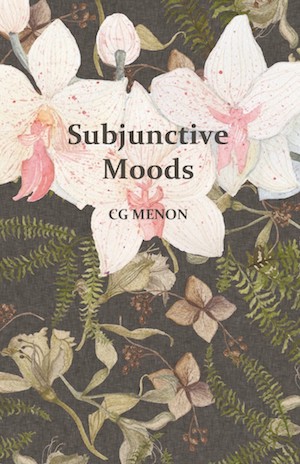
(‘Pages‘ © Lucas Combos, 2008)
OFF THE PAGE AND INTO OUR LIVES
by MELISSA FU
I first came across CG Menon’s writing in The Lonely Crowd with her story, ‘For You Are Julia.’ It drew me in immediately and stayed with me long after the last word. Precise but not precious, exquisitely observed, the story is a bittersweet meditation on the themes of roads not taken, parallel lives, and mid-life doubts. I loved it. Then I read ‘The Ampang Line’, winner of Bare Fiction’s 2016 short story award. This many-layered story is heady with a sense of old ghosts clutching old grudges and snickering at new mischief. I was struck by how different the settings and tones were in the two pieces, but the writing was equally captivating in both. Impressed by Menon’s breadth and narrative command, I definitely wanted to read more. So I was delighted to learn of her debut collection, Subjunctive Moods, from Dahlia Publishing.
The short story is a challenging form. Within the space of a few thousand words, the writer is responsible for casting and controlling a balancing act of suggestion and action, introducing and developing characters with depth and dimension, raising questions worth asking and inviting possible answers without spelling out definitive punch lines. A glance at CG Menon’s accomplished record of publications and competition wins – including the Bare Fiction Prize, The Short Story Award, and the Asian Writer Prize, amongst many others – confirms that even though this is a debut publication, its author is already widely lauded and loved for her short stories.
 The collection is a masterclass, showcasing the many elements of a successful short story:
The collection is a masterclass, showcasing the many elements of a successful short story:
Bewitching first lines? ‘So Long, So Long’ starts with this one-sentence paragraph: ‘I used to be a god.’ Immediately we want to know who is talking and what happened. In the story, we live through a pivotal morning with Arjun, a surgeon who has nursed a life of small humiliations and large losses. His actions leave us wondering how to resolve being a god with being a man who somehow continually falls short. Then there’s ‘Aunty’, a story about the dangers of underestimating the desires and craftiness of children, which begins with the unsettling proclamation: ‘It wasn’t till after we burnt her that Leila began to cause trouble’. Who wouldn’t want to keep reading after an opening like that?
Succinct and satisfying descriptions? In ‘The Names of Things’, a story of understated despair, a character is introduced as ‘a nugget of a man, with nicotine-stained hair and a leathered face dry as dubbin wax’. In this one phrase, I feel I know exactly what the man looks like and can guess what life has done to him.
Tiny gestures that speak volumes? ‘Old gold light spills over the jagged eaves, but Edward draws the curtains before it can get into the house’ – I love how this line, from ‘For You Are Julia’, elegantly combines atmosphere, metaphor and motion.
Rich endings? I am a fan of short stories with open endings. Leaving room for readers to make their own final calls on motives and meaning is an act of trust and bravery from the writer. When successful, these endings cultivate personal connections that vary from reader to reader, often giving the story an unexpected depth. Many of Menon’s stories have expansive endings, but the one that stood out for me was ‘Peacocks’. Told from the point of view of young girl Asha, the story triangulates the complex relationships between grandmother, mother and daughter. Our sympathy for Asha grows throughout the story as we feel her love for her grandmother and her frustration with her mother. But towards the end we witness, along with Asha, a tender scene between her mother and grandmother that recasts the relationships between all three women in a new light. It’s the kind of ending that makes me want to read the story again right away, with more generous eyes and ears.
Some of the stories, including ‘Watermelon Seeds’, ‘Aunty’ and ‘Peacocks’, were immediate love at first read. From the first line to the last word, I was enthralled. Others took a second or third read for me to find my way in to the story. But multiple readings yielded rewards. One of the later stories, ‘Seascapes’, almost got away. Initially, I read the collection quickly and when I looked back over the titles, I couldn’t remember what that story was about. On a second and third read, and after I considered the collection as a whole, it revealed itself like a blooming flower. The main character, Deepa, could be an older version, a sister, mother or aunty of many of the characters in the collection. Hers was an early childhood in India, followed by emigration to the UK, and marriage to an Englishman. Throughout the story, we become acutely aware of a life studded with compromises. So we can’t help cheering her on when she makes an escape, even if only for a day, to a stream in Middlesbrough where, as a child on a family outing, she snuck away and imagined becoming a makara, a Hindu sea-creature. For me, this is a story about what we carry, what we leave behind, and what we can’t help returning to; a story about what does and does not last. It has become one of my favourites.
 If the short story is a difficult beast to write, then assembling a successful collection requires the skill of a lion tamer or ringmaster. Or maybe both. There is always the risk of all the narrative voices colliding and sounding the same, especially if several of the stories are first person. Overlapping themes can result in dull repetition. On the other hand, if the stories are too disparate, the whole can seem an accidental jumble of ideas, voices and styles that don’t quite come together, making the collection feel choppy or disjointed. Subjunctive Moods stumbles into none of these pitfalls. Menon navigates the territory of the collection as successfully as she wields the form itself. The collection opens with ‘The Ampang Line’, a story about a couple’s attempt to fix what is already irreparable. It begins with a question and high hopes: ‘“Excited, Shalini?” Dilip shifts up a gear and all the ghosts crowded into the back seat rock together and nod their invisible heads.’ We nod our heads too, and while excitement does follow, it isn’t always what the characters or readers expect.
If the short story is a difficult beast to write, then assembling a successful collection requires the skill of a lion tamer or ringmaster. Or maybe both. There is always the risk of all the narrative voices colliding and sounding the same, especially if several of the stories are first person. Overlapping themes can result in dull repetition. On the other hand, if the stories are too disparate, the whole can seem an accidental jumble of ideas, voices and styles that don’t quite come together, making the collection feel choppy or disjointed. Subjunctive Moods stumbles into none of these pitfalls. Menon navigates the territory of the collection as successfully as she wields the form itself. The collection opens with ‘The Ampang Line’, a story about a couple’s attempt to fix what is already irreparable. It begins with a question and high hopes: ‘“Excited, Shalini?” Dilip shifts up a gear and all the ghosts crowded into the back seat rock together and nod their invisible heads.’ We nod our heads too, and while excitement does follow, it isn’t always what the characters or readers expect.
The initial stories establish a wide geographic and thematic scope, stretching from Malaysia in ‘Aunty’ and ‘The Ampang Line’, where characters are haunted by a past that is always present, to Australia in ‘The Names of Things’, and Wales in ‘Clay For Bones’, where displacement from familiar surroundings becomes the catalyst for exploring unknown inner landscapes. I found the later stories in the collection to be more subtle, slightly quieter – for example, ‘Farne Islands’ distills a lifetime’s dynamic of sibling love and rivalry between two widowed sisters into the hours of a damp evening at the end of a disappointing holiday. By that time, Menon’s writing had earned my trust and I was willing to work a little harder for more complex meanings to arise. Furthermore, the later stories often provide space for ideas from earlier stories to resonate and harmonise. When the leitmotif of parallel lives is explored in ‘For You Are Julia’ and ‘Daylight Savings’, each holds the theme up to a different light, and thus we appreciate the complementary impacts of both. ‘Subjunctive Moods’ and ‘Watermelon Seeds’ both occupy the neither-here-nor-there territory of early adolescence, but each offers its own variation on the way loyalty can spin on a glance, a blush, a double-edged act of kindness.
When I read a novel, I want to be completely absorbed. I enter the world of the book and forget my own. On the other hand, the short stories I love best do just the opposite. Once I’ve read them, the characters rise off the page and seep into my life. Over the past few weeks, would-be CG Menon characters have been showing up wherever I look. I see them out of the corner of my eye in the queue at the grocery store, at the next table over in a café, or walking down the street in the wrong shoes with a cardigan over a sari, and I wonder if they are on their way to appearing in one of her stories. In Subjunctive Moods, we find our neighbours, our friends, our past loves, our old enemies, our family and, sometimes, even ourselves.
~
 Melissa Fu grew up in Northern New Mexico and moved to Cambridge UK in 2006. She was the regional winner of the Words and Women 2016 Prose Competition and was a 2017 Apprentice with the London-based Word Factory. Her work appears in several publications, including The Lonely Crowd, International Literature Showcase, Bare Fiction, Wasafiri Online, and Words and Women.
Melissa Fu grew up in Northern New Mexico and moved to Cambridge UK in 2006. She was the regional winner of the Words and Women 2016 Prose Competition and was a 2017 Apprentice with the London-based Word Factory. Her work appears in several publications, including The Lonely Crowd, International Literature Showcase, Bare Fiction, Wasafiri Online, and Words and Women.
